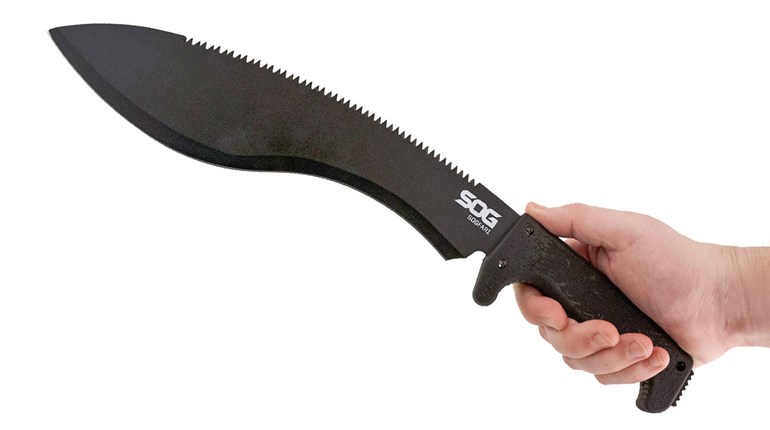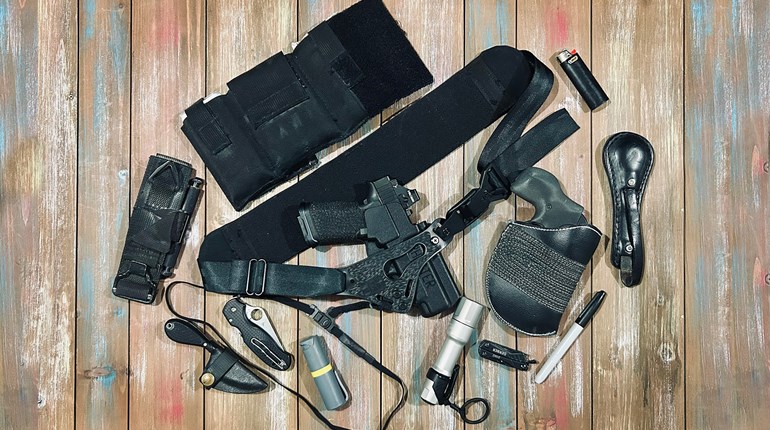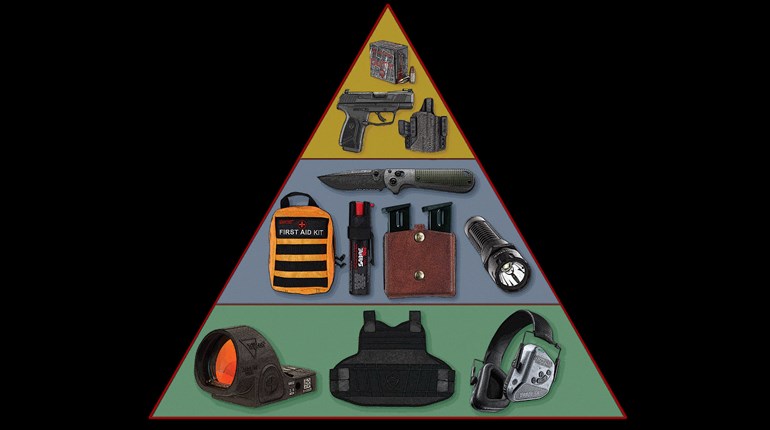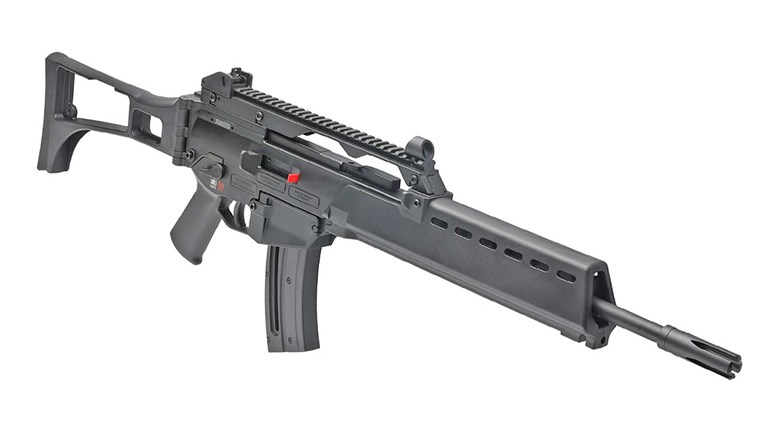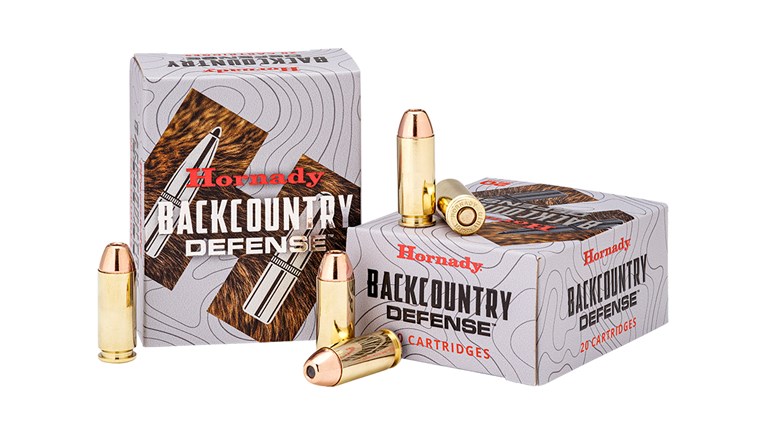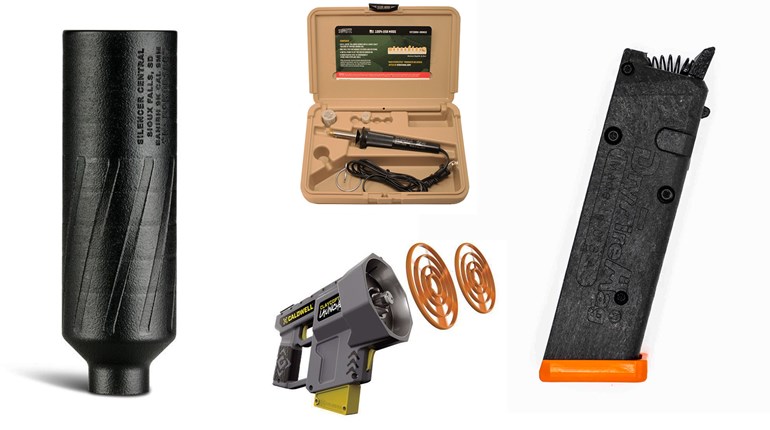
“The knife is the most durable, immortal, the most genius thing that man created. The knife was the guillotine, the knife is the most universal means of solving all knots, and along the blade of a knife lives the path of paradox, the single most worthy path of a fearless mind.” -Yevengy Zamyatin
There are two things that confound me: knife laws and people who do not carry a knife. Laws concerning knives truly perplex me, if for no other matter than the knife predates law, except for perhaps the law of the jungle, which pretty much says you should have a knife.
On a shelf in our living room is a stone axe head I found some years back hiking with my wife on a trip in the Rockies. I remain fascinated by its smooth river stone surface, its intentionally ground edge and grooved center line, where a handle was once secured. It could be a thousand or three thousand years old. It could be three hundred years old. Yet were I to fashion a handle from a green sapling and bind it with cord, it could be called to service once again. Certainly, it wouldn't perform with the perfection of a modern steel axe, but it would serve its task and purpose, nonetheless.
Hence if man, ancient or modern, could sit down by a fire and steadily work, stone on stone, to grind an edge to a point, then one has to question the reasoning of laws governing knives. Of course, rare is such the case that anyone ever asks me to solve such questions.
Man's search for the perfect knife is futile. I understand this, and I understand this with maddening repetition since the summer of 1982 when I was given my first knife by the Old Man from his green tackle box. Three decades later, the only thing that's changed is the amount of new knives that replace the previous year's "Knife to End All Knives." Yet, in all these years of pursuit, I’ve come to be honest with myself about what the ideal knife means.
The knife is very much a signature of the individual and sometimes that individual's mood. I’ve carried "tactical” folders and simple lock blades with wood scales. There are even a couple of turn-of-the-century Microtech OTF (out-the-front) automatic knives that make their way into rotation on occasion. Much like there is no one-gun solution, there is no one-knife solution either. I've learned this from operating all over the world, more often with a knife and without a gun for defensive purposes.
Though introduced a few years ago, I discovered Spyderco’s Sub-Hilt folder and the similarly designed Lil’ Sub-Hilt last winter. Originally conceived then executed by knife maker Butch Vallotton, only to later be put into production under licensed collaboration with Spyderco, the Sub-Hilt folders exude a classic styling that has been absent of late.

They have something of an avante-garde appearance from a bygone age. These seem like knives that Hemingway might have fondled in a sporting goods store in post-World War I Paris. He no doubt would remark on the beautiful lines or the stout blade that could whittle a sling shot, ward off a thug or breast a duck. Then lamenting over its cost, he'd settle on the simple Opinel or Laguiole.
The Spyderco Sub-Hilt knives are a strange melding of an Italian Stiletto and Japanese Tanto without the delicate nature of either. Instead, the blades are robust at a thicknesses of 3.5 mm and 4 mm with vault-like Michael Walker Linerlocks. The ambidextrous thumb studs, placed behind the infamous Spyderhole, act like an over-travel stop, coming to rest in the recessed slots on the front of the frame.
The steel of the blade is where some of the upper-end pricing comes from. CPM-S30V steel was designed from the ground up by Dick Barber of Crucible Industries to not only be corrosion-resistant but also more effective in piercing and cutting. Due to the vanadium carbides that are evenly distributed across the refined steel blades, CPM-S30V steel gives you a blade that is easier to sharpen without compromising the overall integrity of the blade itself. The blade is hollow-ground along the main body of the edge, coming into a convex-grind at the tip. This is beneficial for knives one would call upon for emergency and potentially defensive use.
The handles are a highly polished, smoothed G10 that will not destroy the pockets or waistband of your pants. The steel-lined handle is so thick in fact, that the knives are not capable of being opened by inertia, where one flicks the wrist to open the blade. At least this was true for me, and this is often a method I have deployed for many folders for many years. For a knife that is going to be put to use regular as a working knife, one might find it more comfortable with the blade carried tip up because of the pocket clip placement being out of the way of the primary grip area of the index and middle fingers. From a defensive mindset, tip down may prove more desirous.
I firmly believe this is simply a matter of personal preference and individual dexterity with little else remaining, despite knowing that this has been debated to extremes over beers and the internet. I assure you, the sun will neither rise nor set over either position of the spring-steel clip. That said, having always used the pocket clips on knives as they came from their respective factories, the Spyderco Sub-Hilts were the first knives I've used that required a change their carry position.
When they arrived, both the Sub-Hilt and Lil Sub-Hilt came with their pocket clips positioned at the rear of the handle for a “tip-up” carry. After a few days, with the knives stuck in my waistband in an appendix-carry position, just behind the first belt loop on the right side, I felt like the bulbous steel from the round hole was poking me in the lower abdomen, so both clips were repositioned for a “tip-down” carry. With the radical descent of the blade’s spine, this places the pronounced “Spyder-hole” to be better situated along the belt-line for better a better draw.
It’s important to note that while we are talking about the Sub-Hilt and the Lil Sub-Hilt, they are in fact two separate knives. Much about them are similar, and without looking at both simultaneously, it would be easy to think of the Lil’ Sub-Hilt as a smaller, exact copy of its larger brother, But upon closer viewing, one notices that the ergonomics are actually different. The hilt of the Lil- Sub-Hilt is curved and rounded, whereas the larger version has squared and angular lines that is reminiscent of a coffin-shaped handle. The swedge on the Lil- Sub-Hilt arches slightly over the course of the spine, while on the Sub-Hilt it is flat and straight.

When I first came across them, it was the Sub-Hilt (the larger knife) that truly caught my eye. I’ve come to rest on the idea that the 4-plus-inch bladed folder, while no doubt effective, is more trouble than it’s worth, having settled on the 3.75-inch blade as my personal favorite blade length for such applications. In winter months, where a heavy coat is often in use, I have come to rotate my folder into either my coat pocket, or in the case of my Filson wool Cruiser, between the buttons along the breast, for easy access or slipping it into the palm of my weak hand while I walk somewhere. Once I get to where I am going, the knife is discretely slipped back into the waistband of my pants. The Sub-Hilt fills this niche perfectly.
That said, I was completely taken back with how much I like the Lil’ Sub-Hilt. Where Spyderco’s Paramilitary 2 has practically become the spokesperson for the knife company, due to its well-deserved reputation for toughness, I have little doubt after these last three or four months of reviewing that the Lil Sub-Hilt can take anything that the Para 2 can handle. So much did I like the Lil-Sub-Hilt that shortly after carrying it and using it, I gave my Spyderco Native 5 to my wife, a knife that I felt (and still do feel) is one of the best 3-inch bladed folders on the market.
In the current “tactical environment,” there is this overarching attitude to denounce any romanticized notions of style, that all things much be utilitarian but not “heavy" to be of real use and, at all points, it should be viewed as disposable. I would contend that "tactical" has become a theme of armed fashion, but a fashion it remains, and appearance still plays a role in any kind of fashion. Butch Vallotton in essence, delivered 1930s Art Deco into a 21st-century tactical folder. Spyderco has simply insured that is available to all of us.
If I'm honest, the Sub-Hilts don’t do anything special, which is likely terrifying for any marketing executive to hear. Their steel, regardless of its near-perfection in chemistry, will not cut through re-enforced concrete, and neither of the knives weigh less than a feather. They are, however, beautiful and functional. They grace your hand in their own way, while doing what all knives do since the first knife came along. They cut ,which is all one should ask for. Despite that utilitarian view, it’s also perfectly fine to enjoy the heft and design put into them, as with any object.
The Sub-Hilt (Large)
OAL: 8.6 inches
Closed: 5 inches
Blade Thickness: .156-inch/4 mm
Tip Carry Position: Up or Down options
Clip Positioning: Ambidextrous
Blade Length: 3.7 inches with an edge length of 3.5 inches
Handle: Polished G10
Lock Type: Liner Lock
Steel: CPM-S30V
Weight: 6.2 ounces
Blade Grind: Hollow
Lil' Sub-Hilt
OAL: 7.3 inches
Closed Length: 4.2 inches
Blade Thickness: .138-inch/3.5 mm
Blade Length: 3.2 inches with an edge length of 2.8 inches
Steel: CPM-S30V
Blade Grind: Hollow
Handle Length: 4.25 inches
Lock Type: Liner
Weight: 5.2 ounces
Handle Material : Polished G10
Clip Position: Ambidextrous
Origin: Taiwan












